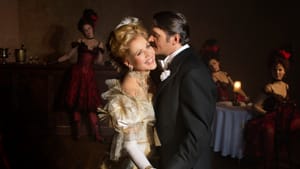Stay in the Loop
BSR publishes on a weekly schedule, with an email newsletter every Wednesday and Thursday morning. There’s no paywall, and subscribing is always free.
Renée Fleming, Susan Stroman: What could possibly go wrong?
'The Merry Widow' at the Met

The Merry Widow is an echo of Vienna’s imperial heyday, with nostalgia that should be crowd-pleasing. Since it has folk dances plus waltzes plus the cancan, it was appropriate to engage the fabulous Susan Stroman to choreograph and direct the production. But her work here is subpar compared to her many Broadway successes. Perhaps she was intimidated by the huge hall or the musical bureaucracy, but her work only came to life in the final act.
Some writers criticized the lack of intimacy in the 3,800-seat house, some blamed the translation of the libretto, and some faulted the casting of Renée Fleming. I put the onus on the operetta itself, although I’ve loved Lehár’s works for years. His predecessors, like Johann Strauss and Emmerich Kálmán, constructed expansive musical sequences with great ensembles; Lehár did not. Strauss and Kálmán wrote stage pieces that had drama and suspense as well as humor; The Merry Widow is predictable.
The story is set in turn-of-the-20th-century Paris, when the fictional nation of Pontevedro faces financial ruin because its wealthiest citizen, the widow Hanna Glawari, is in the French capital to find a husband; if she marries anyone but a Pontevedrian, she will forfeit her inheritance and the country will go broke.
Fleming flat
Renée Fleming convincingly portrayed the haughty and wistful aspects of the millionairess, but not her merriness, and her singing was awkwardly over-projected. The floating high B pianissimo at the end of the “Vilja” song was okay on an earlier radio broadcast but flat during the live radio-and-cinema simulcast. Even when she hit her notes accurately, there was little shimmering frisson. Most of the role lies lower than the best part of Fleming’s voice. It has really a middle-soprano range, so it should sound better when the mezzo-soprano Susan Graham takes over the part after Fleming’s departure on January 31.
Hanna’s long-ago lover, reluctant to get tied down, was the handsome Nathan Gunn, though his voice was rougher than his usual. The accomplished Broadway star Kelli O’Hara made the best impression of the night in her Met debut as Valencienne, the unfaithful wife of the ambassador, who was played by the reliable Thomas Allen. Tenor Alek Shrader seemed out of his element.
The comic embassy secretary Njegus, so well played by Daniel Pantano two years ago in a Wilmington Opera production, was enacted as a stereotypical flaming queen, even though the libretto indicates that the character lusts after women. This impersonation was as confusing as it was homophobic.
William Ivey Long’s costumes are opulent, while the sets by Julian Crouch were merely serviceable. Andrew Davis conducted with grace; he alone among the production staff projected the work’s frothy jauntiness.
Choosing the wrong words
Sams’s libretto contained some gaucheries, like the double entendres confusing the widow’s “millions” for “melons.” He also was historically inaccurate when he wrote dialogue about how women now had the vote but refrained from making a choice — the European monarchies of that period did not allow voting and the French Republic did not allow female suffrage until the 1940s.
There’s much too much talk; the libretto could have been cut considerably so we could get to the music — which, after all, is what we care about. The plot is so clichéd that audiences don’t need to have it spelled out. The production has too little wit, paired with performances that had too little sparkle.
The best part of the production was the seamless transformation from Mme. Glawari’s party to Maxim’s as Act 2 transitioned to Act 3 without a pause. Here, Stroman let loose with dazzling dances, and O’Hara was surpassingly agile when she joined the cancan.
What, When, Where
The Merry Widow (Die Lustige Witwe). Composed by Franz Lehár; Libretto by Viktor Léon and Leo Stein; English translation by Jeremy Sams. New production by the Metropolitan Opera, Susan Stroman directed. Andrew Davis conducted. Through May 7, 2015, although Renée Fleming departs the cast after January 31. Lincoln Center, New York. 212-362-6000 or www.metopera.org.
Sign up for our newsletter
All of the week's new articles, all in one place. Sign up for the free weekly BSR newsletters, and don't miss a conversation.
 Steve Cohen
Steve Cohen